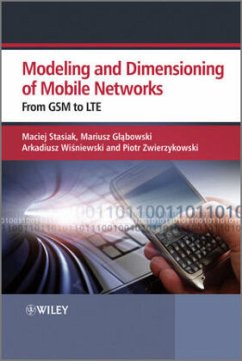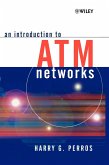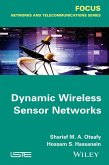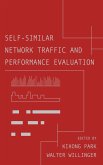This book is a must-read for all network planners and other professionals wishing to improve the quality and cost efficiency of 3G and LTE networks
In this book, the authors address the architecture of the 2/3G network and the Long Term Evolution (LTE) network. The book proposes analytical models that make the analysis and dimensioning of the most important interfaces, i.e. WCDMA or Iub, possible. Furthermore, the authors include descriptions of fundamental technological issues in 2/3 G networks, basic traffic engineering models and frequent examples of the application of analytical models in the analysis and dimensioning of the interface of cellular networks. The specific knowledge included in the content will enable the reader to understand and then to prepare appropriate programming softwares that will allow them to evaluate quality parameters of cellular networks, i.e. blocking probabilities or call losses. Additionally, the book presents models for the analysis and dimensioning of the Wideband Code Division Multiple Access (WCDMA) radio interface and the Iub interface, both carrying a mixture of Release 99 traffic (R99) and High-Speed Packet Access (HSPA) traffic streams. Finally, the analytical models presented in the book can be also used in the process of modeling and optimization of LTE networks.
Key Features:
Describes the architecture and the modes of operation of the cellular 2/3/4G systems and the LTE network
Covers the traffic theory and engineering within the context of mobile networks
Presents original analytical methods that enable their users to dimension selected interfaces of cellular networks
Discusses models for the analysis and dimensioning of the Wideband Code Division Multiple Access (WCDMA) radio interface and the Iub interface, both carrying a mixture of Release 99 traffic (R99) and High-Speed Packet Access (HSPA) traffic streams
Includes problems as well as an accompanying website containing solutions, software tools and interactive flash animations
This book will be an invaluable guide for professional engineers (radio planning engineers, optimization engineers, transmission engineers, core network engineers, Service Management engineers) working in the areas of mobile wireless networks technology, not only in optimization process, but also in profitability assessment of newly implemented services (i.e. in NPV - Net Present Value analysis), and researchers and scientists. Advanced students in the fields of mobile communications networks and systems will also find this book insightful.
Hinweis: Dieser Artikel kann nur an eine deutsche Lieferadresse ausgeliefert werden.
In this book, the authors address the architecture of the 2/3G network and the Long Term Evolution (LTE) network. The book proposes analytical models that make the analysis and dimensioning of the most important interfaces, i.e. WCDMA or Iub, possible. Furthermore, the authors include descriptions of fundamental technological issues in 2/3 G networks, basic traffic engineering models and frequent examples of the application of analytical models in the analysis and dimensioning of the interface of cellular networks. The specific knowledge included in the content will enable the reader to understand and then to prepare appropriate programming softwares that will allow them to evaluate quality parameters of cellular networks, i.e. blocking probabilities or call losses. Additionally, the book presents models for the analysis and dimensioning of the Wideband Code Division Multiple Access (WCDMA) radio interface and the Iub interface, both carrying a mixture of Release 99 traffic (R99) and High-Speed Packet Access (HSPA) traffic streams. Finally, the analytical models presented in the book can be also used in the process of modeling and optimization of LTE networks.
Key Features:
Describes the architecture and the modes of operation of the cellular 2/3/4G systems and the LTE network
Covers the traffic theory and engineering within the context of mobile networks
Presents original analytical methods that enable their users to dimension selected interfaces of cellular networks
Discusses models for the analysis and dimensioning of the Wideband Code Division Multiple Access (WCDMA) radio interface and the Iub interface, both carrying a mixture of Release 99 traffic (R99) and High-Speed Packet Access (HSPA) traffic streams
Includes problems as well as an accompanying website containing solutions, software tools and interactive flash animations
This book will be an invaluable guide for professional engineers (radio planning engineers, optimization engineers, transmission engineers, core network engineers, Service Management engineers) working in the areas of mobile wireless networks technology, not only in optimization process, but also in profitability assessment of newly implemented services (i.e. in NPV - Net Present Value analysis), and researchers and scientists. Advanced students in the fields of mobile communications networks and systems will also find this book insightful.
Hinweis: Dieser Artikel kann nur an eine deutsche Lieferadresse ausgeliefert werden.








